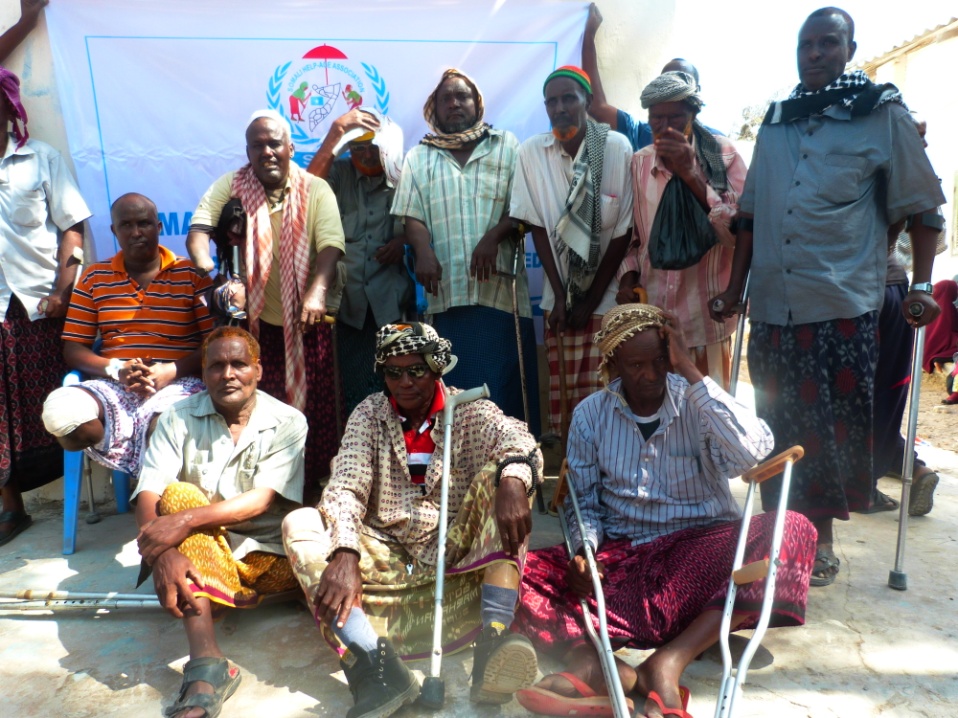
The Somali Help-Age Association (SHAA) has undertaken innovative policies and practices, with strategy related to the Sustainable Development Goals (SDGs) that focuses on SDGs 1, 2 and 8. The programme aims to achieve SDGs 1 and 2 by reducing hunger for the poor elderly and the disabled people in Somalia and by fighting extreme poverty among these groups. The programme also aims to meet SDG 8 through recovery projects for disabled and elderly persons that establish small income generating activities and microfinance programs.
SHAA is a Somali local NGO founded in 2003 with the aim of eliminating poverty and reducing hunger among vulnerable Somali communities by assisting the most needy elderly and disabled peoples in Somalia through relief, recovery and development programmes with the provision of addressing their immediate needs and advocating their basic social, economic and cultural rights.
The programme’s strategy targets older persons and persons with disabilities specifically. They are also identified and prioritised as the most vulnerable groups in Internally Displaced Person’s (IDP) camps and in remote, rural areas. The most accessible of these locations were chosen for the project’s initial implementation.
The direct beneficiaries of this programme were elderly and disabled persons who were selected on the basis of their gender and need, while indirect beneficiaries included the entire population affected by poverty and hunger. Stakeholders in this programme included beneficiaries, local authorities, traditional leaders and civil society groups as well as implementing partners and donors.
Results
Hunger was reduced by assisting vulnerable elderly and disabled persons living in IDP camps and remote rural villages; 60% of their needs were met through food vouchers and cash relief distributions. SHAA priorities included a clear strategic program that helped older persons and persons with disabilities, and improved their living standards through direct intervention by addressing their immediate needs.
SHAA advocates and supports disabled older persons in remote, rural villages and IDP camps in Mogadishu and Gedo region of south and central Somalia by providing donkey carts, wheelchairs and walking sticks donated by our members. We have also provided food with high nutritional value and other non-food items such as mattresses, mats and blankets to help them endure humanitarian crises and stresses.
There are hundreds of elderly and disabled persons who are poor, weak, ill and displaced. Many experience hunger and malnutrition with no household income living in IDP camps or in remote areas.
DUNIA’S STORY
SHAA has represented elderly and disabled persons in Somalia, and the story of Dunia, 61 years old is one success story. Dunia is an old, disabled woman who was vulnerable and poor. She lost her left eye and right leg due to a rocket and mortar shell during the fighting between government forces and the Alshabab extremist group in Mogadishu. She was caring for 4 orphaned grandchildren of her son who was killed in the civil war. The 5 of them moved and were living in a small cottage in a Mogadishu camp for internally displaced people. Two of the children were born with a disability.
One day, as our organisation was undertaking an assessment of the elderly and disabled persons in the IDP camp, we heard Dunia’s story. SHAA immediately addressed Dunia’s situation by donating 50kg of sugar, rice, cooking oil, milk powder, 5 mattresses and a cooking kit. We also transported her and her children to a health clinic for a medical check-up. SHAA has continued to support Dunia’s family while they are in the camp.
Lessons Learned
SHAA identified a gap between the target population and communities in selecting humanitarian activities in Somalia. Most of the projects implemented were based on a top-down approach, according to local leaders consulted by our field staff.
Addressing the needs of older persons and persons with disabilities in Somalia has long been outside of the humanitarian agenda. As such, most of the programmes and projects developed and implemented in Somalia have not followed through in reaching their goals, nor have they involved a participatory approach that could include discussions with eligible local authorities, traditional leaders and the communities concerned.
Many local leaders have reiterated that they have never seen the projects or programmes that have directly or indirectly targeted the short and long term development needs of older and disabled persons in Somalia. Therefore, there has not been a clear strategic policy that addresses the needs of older and disabled persons, making them the most vulnerable groups in humanitarian crises because of their exclusion from development programmes.
The policy strategy maintained by our organization includes fundraising events, advocacy and awareness campaigns which have become the central funding source of our projects.
Future Recommendations
Future strategic policies and programs to implement the SDGs in Somalia must include older persons and persons with disabilities. Food voucher and cash relief interventions that target older and disabled persons should be considered when addressing their immediate needs. Local leaders advise that bottom-up approaches should be implemented. Community needs must be discussed on the ground and individuals should be consulted during the project selection process that prioritises the most vulnerable groups.
 Welcome to the United Nations
Welcome to the United Nations

